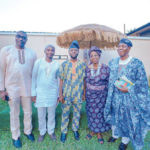Nigeria at 57
First, we can only build a nation which is in existence. We must thank God for sparing Nigeria and Nigerians. Watching how hurricane has devastated Florida, Miami and Caribbean Islands of Cuba, God truly loves Nigeria. Very few countries could have survived three years of wasteful civil war with over one million lives lost, destructive long military regimes, criminal annulment of June 12,1993 elections and challenges of transition following the death of the late Umaru Yar’Adua in 2010, mindless looting of the common wealth by some leaders and, of course, bestial Boko Haram terrorism. It is true Nigerians are resilient, but no nation can and should be living permanently on the edge or on the brink. I agree with President Muhammadu Buhari that the unity of the Federal Republic of Nigeria is sacrosanct and settled in our constitution. Unity of the federation is mentioned 31 times in the 1999 Constitution. The opening of the constitution says it: “We the people of the Federal Republic of Nigeria Having firmly and solemnly resolved to live in unity and harmony as one indivisible and indissoluble sovereign nation under God, dedicated to the promotion of inter-African solidarity, world peace, international co-operation and understanding.” Indeed, unity is not just the means; it is the end. The constitution further states: “And to provide for a Constitution for the purpose of promoting the good government and welfare of all persons in our country, on the principles of freedom, equality and justice, and for the purpose of consolidating the unity of our people.”
With all their political differences, the founding fathers and mothers were united on the need to terminate British colonial independence in 1960. All compatriots must, as a matter of duty, promote inclusion. All governors and legislators, not just president and vice-president must foster unity and guard against regionalism. It should be made an impeachable offence for any governor or legislator who swore to the constitution to openly canvass for “regionalism” and “separatism” not known to the constitution. Chief Obafemi Awolowo had his frustrations with imperfect elections, but he kept faith to the end in the Nigeria project. He had thoughts about Nigerian constitution not “regional” constitutions. The burden is on President Buhari and other elected officials. They must work the talk on national unity project. The Federal Government must revisit the conclusions of 2014 national conference, as well as engage all aggrieved Nigerians with a view of rekindling collective commitment to national progress and bringing them from the red lines.
Deepening democracy
Two decades and a half after the annulment many political lessons have been internalised. One lesson learnt is that regardless of their imperfections, elections must produce results. With five conclusive (some controversial!) presidential elections (1999, 2003, 2007, 2011 and 2015), Nigeria has commendably dammed the culture of impunity and annulment introduced by Ibrahim Babangida.
Democracy is not about enthronement of a sinner or a saint. On the contrary, democracy offers opportunity for voters to freely choose out of candidates on offer. Voters can indeed foolishly make wrong choices, but same democratic process makes the voters to correct their foolery and hopefully get it right.
Leadership question
Nigeria is certainly not short of leaders as distinct from the present day dealers. Let us recognise the worthy leaders while alive as we are doing. We need leaders who are connected with people they lead all the times and not when they want their votes. With 45 political parties, the difference is not clear in terms of ideologies and programmes. We must reinvent the political parties. All those pushing President Buhari to run in 2019 are self-serving, even when he is yet to complete the first tenure. My take is that after being twice beaten to it by medically challenged presidential candidates elected as presidents, namely Musa Yar’Adua and Muhammadu Buhari, the hope is that Nigerians, as voters, would be rigorous in their assessment of the wellness of whoever volunteers to govern them. With uninterrupted democratic process lasting 16 years, Nigeria and Nigerians have also made the point that no regime change except through the ballot box. But again, democracy must be democratic and allow for choices. The recent riots in several towns of Togo demanding term limits to put an end to President [Faure] Gnassingbe 12-year rule shows that democracy is democratic only with new faces. President Gnassingbe, in 2005, took over from his father, Gnassingbe Eyadema, who himself seized power in a bloodless coup in 1967.
Nigerian voters must not make kings out of their elected leaders. Nigeria, almost by a spell, has almost become a divisive polity with imaginary labels to legitimise national wealth sharing among the political elite. June 12 offers a lesson in inclusiveness and pan-Nigerianism. We should improve on this and add pan-Africanism and rescue our politics from insular “regional” and “religious” corrupt chieftains. Does anybody remember the profiling of Abiola-Kinbigbe ticket, namely: Muslim-Muslim, civilian-civilian with nationwide mass votes, issue-driven campaign? Does anybody remember that Murtala Muhammed “Muslim” northerner and head of state was killed on a Friday and succeeded by southerner, Obasanjo? Both Abiola and Kingibe were great Nigerians as defined by the constitution. They were good candidates who vigorously campaigned on the pan-Nigerian platform of Farewell-To-Poverty, which resonated with the then 14 million voters, regardless of their callings. This means as recent as 1993, there was a Nigeria in which so-called regions and religions were non-issues in electoral process. There were also millions of voters willing to use the votes to bring about a peaceful political revolution.
So, there is nothing like “Northern poverty” or “Southern poverty,” no less than there is a “Christian” or “Muslim power failure.” We are all united by poverty, electricity outages, insecurity and corruption of the few. Or better still, we must all be united with wealth generation, equity and prosperity as envisaged by 1999 Constitution. It is a sad commentary reading the recent divisive diatribes between elder statesman, Professor Ango Abdullahi, and some misguided youths. As the received wisdom has it, if the youths are so misguided, what of the elders? Without Nigeria, the former special adviser on food security under former President Olusegun Obasanjo and former vice-chancellor, Ahmadu Bello University (ABU), Zaria, would probably not have been known as we know him today. He presided (or almost ruined some would say) over a national university, not a regional enclave. Unemployed and unemployable youths in their frustrations may doubt Nigeria’s relevance, but those Nigeria has invested so much in without adequate returns in terms of development must stand up for a united Nigeria.
There are millions of stateless citizens in the world on account of failed states and collapsed nations. Following the brutal deposition of Muammar Gaddafi, leader of Libya, on October 20, 2011 during the American inspired Battle of Sirte, Libya which got Independence on December 24, 1951 has since disintegrated into some terror cells. Somalia got independence July 1st, 1960; it has since become a failed state in spite of common faith, language and culture. Sudan got independence from both Egypt, and Britain on January 1, 1956, four years before Nigeria. But Sudan after serial wars eventually broke into two with South Sudan. The new South Sudan, officially became the Republic of South Sudan, 54th independent country in Africa after “independence” from Sudan in 2011. Since 2013 with population of just 12,340,000, South Sudan is a lamentable forgotten theatre of wars of attrition between same brothers, namely President Kiir and his former deputy Riek Machar, over who would be the president. In terms of unity and one nation, Nigeria has a lot to celebrate.






